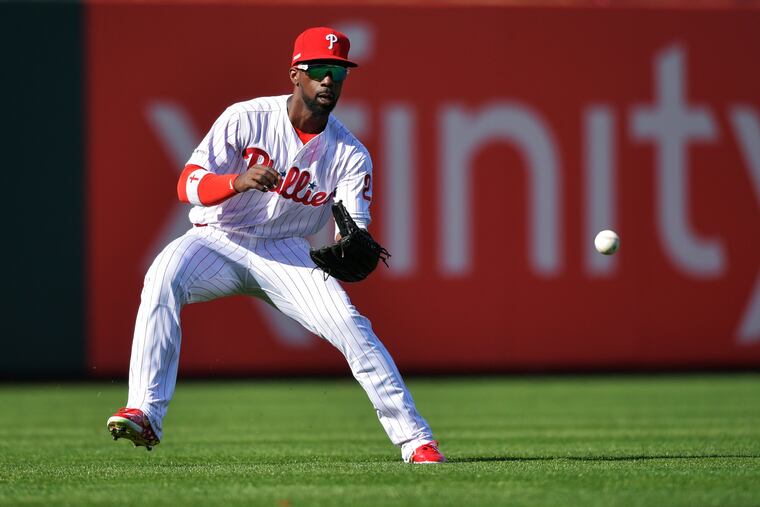Phillies’ Andrew McCutchen has never stopped thinking like a center fielder
By now, the 32-year-old veteran feels comfortable in every outfield spot. But his heart -- and his pride -- will always pull him towards center.

The conversation began in December as one of those in-case-of-emergency scenarios that keep every baseball manager awake at night. If the need ever arose, Gabe Kapler wanted to know whether Andrew McCutchen would mind moving back to center field.
McCutchen's answer -- "Whatever you need, Skip," or some variation thereof -- was pretty much what you'd expect from an 11-year veteran and former league MVP who had just signed a four-year, $50 million free-agent contract. And that was that. They moved on to the next topic.
Deep down, though, the idea intrigued, even excited McCutchen, who never really wanted to vacate center field in the first place. So last week, when the Phillies placed their second center fielder on the injured list in a span of seven days, the 32-year-old jumped at the opportunity.
"I'm always going to view myself as a center fielder even when I'm not playing there," McCutchen said Wednesday before making his fifth consecutive start in that role in place of Odubel Herrera (right hamstring strain) and Roman Quinn (right groin strain). "When I retire, I'm going to retire as a center fielder. I may not be playing there. I may be in right, or left, or whatever. But I'm always going to say, 'I'm a center fielder.'"
McCutchen was a center fielder for most of his life, including his first eight major-league seasons with the Pittsburgh Pirates. It was part of his identity as a team leader. There’s a cachet that comes with playing in the middle of the outfield. It’s where Willie Mays and Mickey Mantle roamed and where Mike Trout plays. And although defensive metrics never treated McCutchen all that favorably, he was considered a top-flight center fielder, even winning a Gold Glove in 2012.
But McCutchen was one of the game's worst defensive outfielders in 2016, according to Statcast, which graded him at 11 outs below average. The Pirates, reacting to the metrics, decided it was time for a change. They slid McCutchen to left field and put Starling Marte in center, a move that didn't sit particularly well with the face of the franchise.
“It was the fact of being able to go out on your own terms as opposed to someone telling you,” McCutchen said. “That was the harder thing to swallow. I was told I was having to play a corner as opposed to being like, ‘Hey, man, when you’re ready, when you feel like it’s time for you to play a corner, then we’ll do that.’ That was taken out of my hands, so that was harder for me to accept.”
The Pirates’ plan went awry anyway only 13 games into the 2017 season, when Marte got slapped with an 80-game suspension for violating baseball’s drug policy. McCutchen returned to center for the rest of the year and made modest improvements.
But he also accepted the reality that hits many center fielders on the other side of 30. The second half of his career would almost certainly be spent in left or right field, where he doesn't have to run as much. Less tread on his legs could mean a few more years.
When the San Francisco Giants traded for McCutchen before last season, they installed him in right field, a challenging spot in cavernous AT&T Park but not quite as demanding as center field. And after being dealt to the New York Yankees midway through last season, he played left field.
The Phillies acquired him to play a corner, too, ultimately settling on left field after signing $330 million right fielder Bryce Harper in spring training.
"I'm comfortable regardless," said McCutchen, who believes center field is actually the easiest spot because it provides a clearer view of balls off the bat. "I came here and played left and I was like, 'OK, cool,' knowing that I could still play center but at the same time understanding the situation with the guys we have and knowing that was the best suited place for me to play. I was fine with that."
Kapler said he considered McCutchen in center field (and Nick Williams in left) even before Quinn injured his groin on April 24. There hasn’t been a drop-off, either, with McCutchen matching Herrera at only one out below average, according to Statcast.
And there likely will be times, even after Herrera returns to the lineup, when McCutchen makes a start in center field. Herrera could be back as soon as Sunday, but if he should need a rest or slip into one of his cold spells at the plate, McCutchen gives the Phillies another option.
"The way that Cutch has taken charge in the outfield when he plays center field gives us a lot to think about," Kapler said.
It’s easier knowing that McCutchen has never stopped thinking of himself that way.
“My natural intentions when I’m out there are always going to be that of a center fielder,” McCutchen said. “It’s never going to change because that’s where I played for nine years. That’s my mentality. When balls go up, I’m trying to get them. I go until someone calls me off.
"Even if I play until I’m 40, I’m going to tell myself that I’m in center field. That’s the way my brain works. I think that’s why I’ve played as long as I have.”